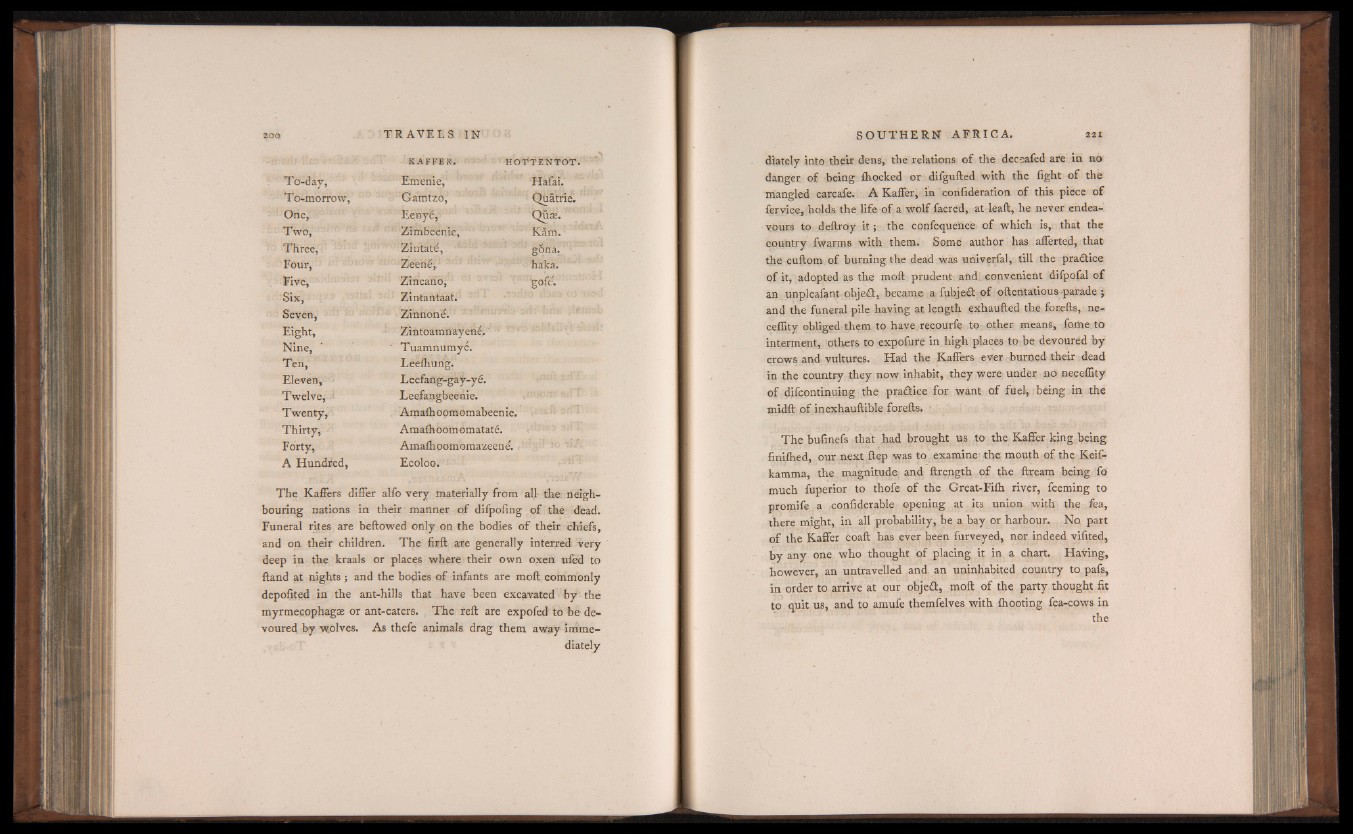
KAFFER. HOTTENTOT.
To-day, Emenie,' Hafai.
To-morrow, Gamtzo, Qüätrie.
One, Eenyé, Qüse.
Two, Zimbeënie, Käm.
Three, Zintate, gona.
Four, Zeené, häka.
Five, Zincano, rgöfe.
Six, Zintantaat.
Seven, Zinnoné.
Eight, Zintoamnayené,
Nine, ' Tuamnumyé.
Ten, Leelhung,
Eleven, Leefang-gay-yé.
Twelve, A Leefangbeenie.
Twenty, Amalhoomomabeenie.
Thirty, Amalhòomomataté.
Forty, Amaflioomomazeené.
A Hundred, Ecoloo.
The Kaffers differ alfo very materially from all the neighbouring
nations in their manner of dilpofing of the dead.
Funeral rites are bellowed only on the bodies o f their chiefs,
and on their children. The firft are generally interred very
deep in the kraals or places where their own oxen ufed to
ftand at nights ; and the bodies o f infants are moll commonly
depofited in the ant-hills that have been excavated by thé
myrmecophagæ or ant-eaters. The reft are expofed to be devoured
by wolves. As thefe animals drag them away immediately
diately into their dens, the relations of the deceafed are in no
danger of being {hocked or difgufted with the fight of the
mangled carcafe. A Kaffer, in confideration of this piece of
fervice, holds the life of a wolf facred, at ieaft, he never endeavours
to deftroy it ; the confeque'nce of which is, that the
country fwarms with them. Some author has afferted, that
the cuftom of burning the dead was univerfal, till the praâice
of it, adopted as the moll prudent and convenient difpofal of
an unpleafant ohjeâ, became a fubjeâ of ollentatious .parade ;
and the funeral pile having at length exhaufted the forefts, ne-
ceflity obliged them to have recourfe to other means, fame to
interment, others to expofure in high places to be devoured by
crows and vultures. Had the Kaffers ever burned their dead
in the country they now inhabit, they were under no neceffity
of difcontinuing the praâice for want o f fuel, being in the
midi! of inexhauftible forefts.
The bufinefs that had brought us to the Kaffer king being
finilhed, our next .ftep was to examine the mouth of the Keif-
kamma, the magnitude and ftrength of the flream being fo
much fuperior to thofe of the Great-Filh river, feeming to
promife a confiderable opening at its union with the fea,
there might, in all probability, be a bay or harbour. No part
of the Kaffer coaft has ever beep furveyed, nor indeed vifited,
by any one who thought of placing it in a chart. Having,
however, an untravelled and an uninhabited country to pafs,
in order to arrive at our objeâ, moll of the party thought fit
to quit us, and to amufe themfelves with fhooting fea-cows in
the